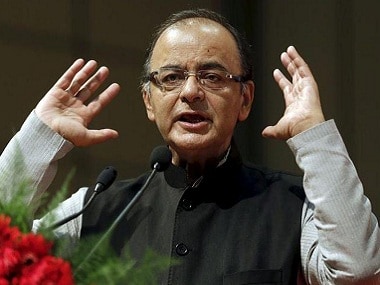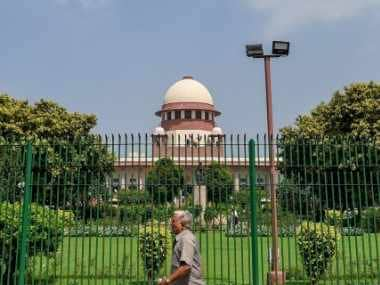Less than three months after the Centre banned high currency notes in November 2016, Union minister Arun Jaitley first floated the idea of electoral bonds in his Budget 2017-18 speech of 1 February, 2017. [caption id=“attachment_5335931” align=“alignleft” width=“380”]  File image of Finance Minister Arun Jaitley. Reuters[/caption] Exactly a year later, on 7 January, 2018, he wrote a Facebook post defending the government’s decision of introducing electoral bonds to make funding political parties “transparent”. Jaitley had argued how the “conventional practice” of cash donations, from anonymous or pseudonymous sources ensured “unclean money”. “It is a wholly non-transparent system,” he said. But concerns were soon raised from several quarters, especially as to why the names of donors are to be kept “secret”. Talking to reporters the same month in 2018, Jaitley had reasoned that this new system upholds “substantial amount of transparency if not total”. Notwithstanding this lack of a not-so-total transparency, the banks started selling electoral bonds from March 2018. By the end of that year, parties had encashed bonds worth Rs 1,045.53 crore, till 18 December, 2018, according to a statement by Union minister Pon Radhakrishnan in the Parliament.
Out of the collected amount, a sum of Rs. 1,045.53 crore was encashed by the political parties.
— Ministry of Finance (@FinMinIndia) December 18, 2018
The Government has not received any concerns from Election Commission on the issue of Electoral Bearer Bonds.
To a question by Trinamool MP Nadimul Haque on whether the Election Commission (EC) had raised concerns about these bonds, Radhakrishnan had also answered that the government failed to receive any notice from the EC in this regard. However, numerous reports, thereafter, revealed that his answer was perhaps a little misleading. Election Commission letter In one report by The Economic Times, it was pointed out that the EC had, in fact, flagged concerns about the bonds nearly two years ago, in 2017. A communication was sent to the law ministry when AK Jyoti was the Chief Election Commissioner. The EC had written a three-page letter on 26 May, 2017 raising concerns over amendments to the Finance Act, 2017, which brought changes in the Income-Tax Act, the Companies Act, 2013 and the Representation of People Act (RPA), 1951 to provide launch of these electoral bonds. The amendments, the commission noted, could have “serious impact on transparency”. Another report by the Live Law mentioned how an EC letter had raised point by point issues about the bonds. The commission described amendments made to Section 29C of the Representation of Peoples Act, 1951 as a “retrograde step”. The change, it said, made it possible for political parties not to report to EC about donations that are received via electoral bonds. The poll panel also said that if contributions go unreported then it will not be possible to ascertain if parties have taken donations from government companies and foreign sources, which is prohibited under Section 29B of the RPA. Further, amendment to the Companies Act, 2013 was also protested. The letter mentioned how this “opened up the possibility of shell companies being set up for the sole purpose of making donations to political parties, with no other business consequence of having disbursable profits”. Regarding changes in the Foreign Contributions Regulation Act, the EC said amendments would “allow unchecked foreign funding of political parties in India which could lead to Indian policies being influenced by foreign companies”. [caption id=“attachment_6075511” align=“alignright” width=“380”]  File image of the Supreme Court of India. PTI[/caption] In an affidavit, the EC also apprised told the Supreme Court how it had conveyed several apprehensions about the bonds in 2017 itself, asking the top court to take a final call on their legality. The apex court had asked the panel its stand on the “ anonymous nature” of the bonds. “Arbitrary, discriminatory move” The EC was not the only one that had raised concerns about electoral bonds. On 2 February, 2018, the apex court had sought the Centre’s response on a plea by the CPI (M) which termed these bonds as “arbitrary and discriminatory”. The plea claimed that the government’s decision entitles political parties to receive unlimited donations without recording its source. Congress leader Mallikarjun Kharge had subsequently remarked what purpose these bonds would serve when the name of the donor is not disclosed. Two more petitions were later filed by NGOs – Association for Democratic Reforms (ADR) and Common Cause. ADR, represented by advocate Prashant Bhushan and others, had also filed an application seeking a stay on the electoral bond scheme which the Supreme Court will hear on 2 April. The application stated that many donations were made in denominations of Rs 10 lakh to Rs 1 crore which raised suspicions about these being given by corporate firms. The application also said most donations were in favour of the ruling party. The Economic Times report mentioned earlier had also stated how first portion of purchased bonds saw Rs 210 crore of the Rs 222 crore bonds going to the BJP. What is an electoral bond? It is similar to a bank note that is payable to the bearer on demand and free of interest. The bonds are issued in multiples of Rs 1,000, Rs 10,000, Rs one lakh, Rs 10 lakh and Rs one crore. These are available at some branches of the State Bank of India and can be bought by a donor with a KYC-complaint account. The bonds can be donated to a party of choice and encashed via the party’s verified account within 15 days. Any political party which is registred under Section 29A of the Representation of the Peoples Act, 1951 (43 of 1951) and has secured at least one percent of votes polled in the most recent Lok Sabha or state election will be allotted a verified account by the EC.


)
)
)
)
)
)
)
)
)



